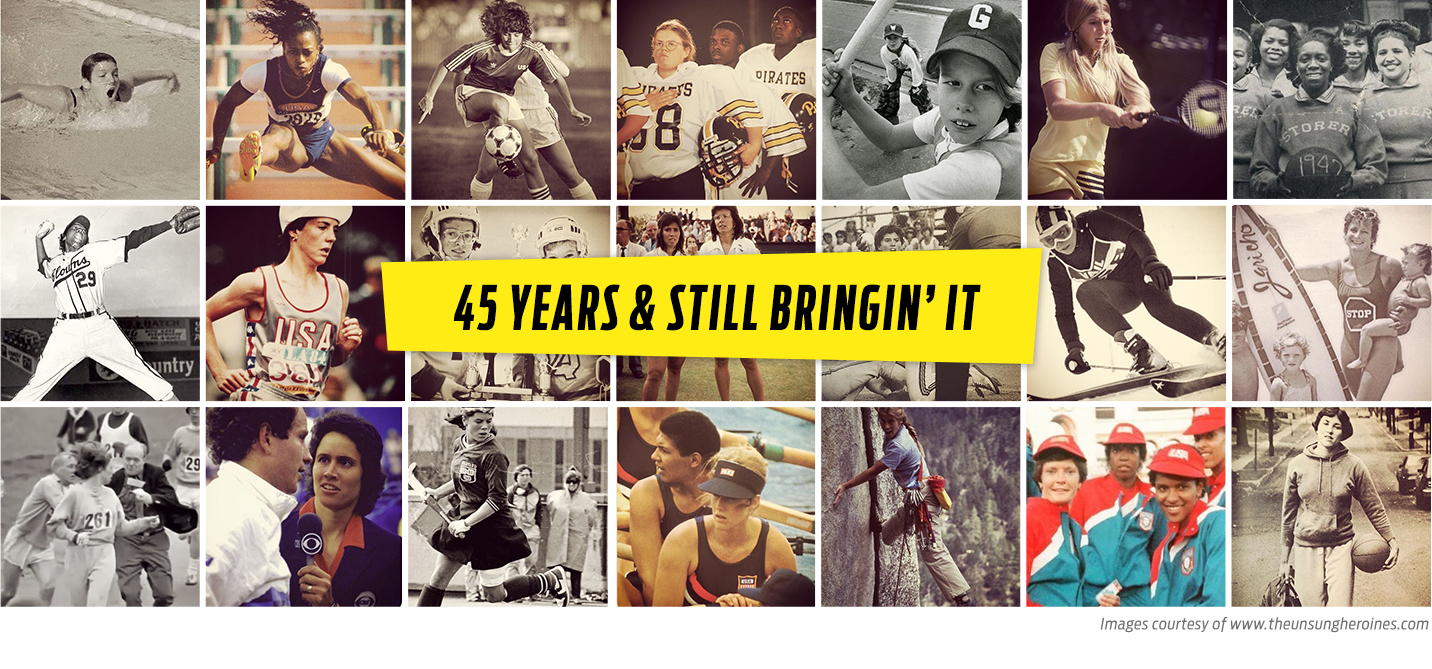 45 years ago this summer, Congress passed Title IX, a piece of legislation, 37 little words, that opened the floodgates of opportunity for girls and women across the U.S.
45 years ago this summer, Congress passed Title IX, a piece of legislation, 37 little words, that opened the floodgates of opportunity for girls and women across the U.S.
Title IX was supported by both Democrats and Republicans and signed into law by Richard Nixon. It became a federal law that required that girls and women have equal access to sport on campuses across the US. And it was a law that would allow a little girl in Greenville, SC to shed the tomboy moniker and instead become an athlete, just an athlete.
That law, Title IX, has gotten lots of little girls and full-grown women, all across the nation, out of the stands and onto the fields. It’s a law still at work today, supporting students as they address the problems of campus sexual assault. And it is a law that continues to have implications far beyond sports, radiating out to board rooms, court rooms, war rooms and yes, some day even oval rooms.
And that little girl from SC? She grew up to become a business woman, one whose confidence was fueled by sport, and whose company is now named Title Nine.

Missy Park, Founder
How did the Title IX legislation change your life?
Images courtesy of Game Changers, the unsung heroines of sports history.

I was 10 when Title IX came into play and I saw the slow application of the new law. It wasn’t until high school that true change in the form of equal sport availability came to Seattle. The old rules hung around throughout the eighties but I experienced remarkable equality with my daughters in the nineties. I thank Title IX for myself but even more importantly,for my daughters’ generation because they don’t have to ever again think about if it’s “ok” to be athletic and put sports before the feminine ideal.
MY 37 WORDS: Title IX enabled women to be considered serious players. It changed the mindset away from women as enablers toward women as competitors. Women could now succeed in the life games that count, business, politics, and yes, athletics.
Perfect!
Being an athlete changed my life. It gave me a place to excel and confidence. It taught me teamwork and leadership skills. I learned about good and bad coaches. But most of all, it taught me the joy and exhilaration of giving my all on the green grass, under a blue sky.
I played my first game of soccer in 1980, because that was what you did when you were six years old and lived in Cincinnati, Ohio. My Catholic school always had enough girls to field a team, and starting in third grade, it was softball; fourth volleyball and basketball; somewhere along there my dad started to teach me how to play golf. Not all the sports stuck, but I learned early how to play on a team, and I learned confidence too. This was important because I was never a small girl – I was tall (and “big boned” we said then – so being able to find my way to confidence in sports was key. I stopped playing my Junior year in high school, but when I began my work career years later, it was that confidence that helped me find my footing in a male dominated industry. Later in life I became a half marathon runner, a triathlete, a coach, an open water swimmer, and again, a golfer. I’m 42 and I don’t think any of that would be a part of my identity without Title 9. On the personal side of things, I think this too matters: I believe that Ttitle 9 allowed me and my dad to spend time together in a way that he might have struggled with without sports. Title 9 forced our dads to see us and help us be equal – and that has made a wonderful difference for all of us.
Such a good point about dads!
In 1970 in junior high, the girls got the gym on Thursdays for basketball. The boys got it the other 4 days. In 1972, I asked the headmaster of my all girl Catholic high school, “The all boys high has 3 sports each season while we only have 2 sports all year. If we were all boys we would have more sports – right?” Of course he said yes. I transferred to the local public school and ran on the boys XC and indoor track team and in the spring a girls team was started.
In college I played club soccer two years as the only woman. Totally welcomed except by a tournament organizer in Canada who said, “no women allowed”. In 1978 I transferred to another college and played on the college’s women’s team. What a change from 1971 !
I still am an athlete now at 60. I still benefit from the physical and teamwork skills that I gained from school and college sports.